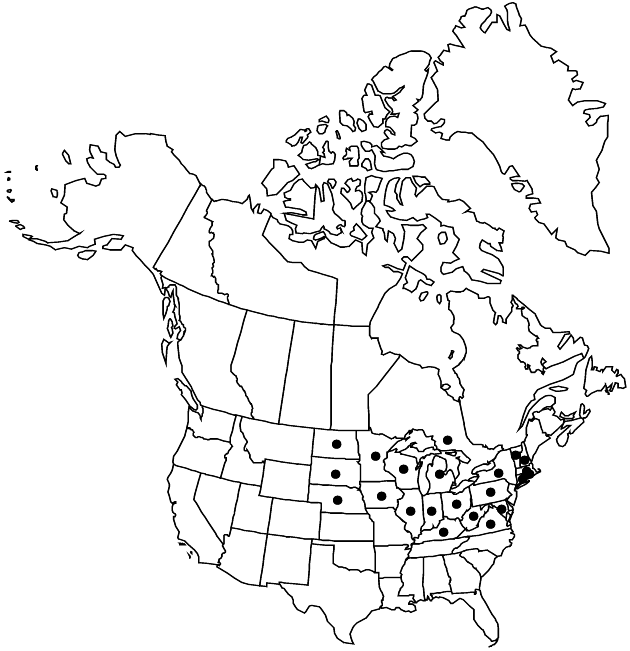Difference between revisions of "Solidago canadensis var. hargeri"
Rhodora 17: 11. 1915.
FNA>Volume Importer |
FNA>Volume Importer |
||
| Line 24: | Line 24: | ||
|elevation=0–500 m | |elevation=0–500 m | ||
|distribution=Ont.;Conn.;Ill.;Ind.;Iowa;Ky.;Md.;Mass.;Mich.;Minn.;Nebr.;N.H.;N.Y.;N.Dak.;Ohio;Pa.;R.I.;S.Dak.;Vt.;Va.;W.Va.;Wis. | |distribution=Ont.;Conn.;Ill.;Ind.;Iowa;Ky.;Md.;Mass.;Mich.;Minn.;Nebr.;N.H.;N.Y.;N.Dak.;Ohio;Pa.;R.I.;S.Dak.;Vt.;Va.;W.Va.;Wis. | ||
| − | |discussion=<p>Variety hargeri is uncommon in more mesic locations in eastern North Dakota, South Dakota, and Nebraska. The more hairy-stemmed race of the species, it is more common in the southern and western portion of its range, where it can completely replace <i></i>var.<i> canadensis</i>. It can be very similar to diploids of <i>Solidago altissima </i>subsp.<i> gilvocanescens</i>, which normally have thicker, sparsely toothed to entire distal cauline leaves. Reports from other more southern and western states are likely based on plants of <i>S. altissima</i>.</p> | + | |discussion=<p>Variety hargeri is uncommon in more mesic locations in eastern North Dakota, South Dakota, and Nebraska. The more hairy-stemmed race of the species, it is more common in the southern and western portion of its range, where it can completely replace <i></i></i>var.<i><i> canadensis</i>. It can be very similar to diploids of <i>Solidago altissima </i>subsp.<i> gilvocanescens</i>, which normally have thicker, sparsely toothed to entire distal cauline leaves. Reports from other more southern and western states are likely based on plants of <i>S. altissima</i>.</p> |
|tables= | |tables= | ||
|references= | |references= | ||
| Line 48: | Line 48: | ||
|publication year=1915 | |publication year=1915 | ||
|special status= | |special status= | ||
| − | |source xml=https://jpend@bitbucket.org/aafc-mbb/fna-data-curation.git/src/ | + | |source xml=https://jpend@bitbucket.org/aafc-mbb/fna-data-curation.git/src/f6b125a955440c0872999024f038d74684f65921/coarse_grained_fna_xml/V19-20-21/V20_327.xml |
|tribe=Asteraceae tribe Astereae | |tribe=Asteraceae tribe Astereae | ||
|genus=Solidago | |genus=Solidago | ||
Revision as of 19:42, 24 September 2019
Mid to proximal stems moderately hairy. Rays florets 5–10(–13), averaging ca. 9. 2n = 18.
Phenology: Flowering Aug–Oct.
Habitat: Old fields, pastures, disturbed grounds, roadsides
Elevation: 0–500 m
Distribution

Ont., Conn., Ill., Ind., Iowa, Ky., Md., Mass., Mich., Minn., Nebr., N.H., N.Y., N.Dak., Ohio, Pa., R.I., S.Dak., Vt., Va., W.Va., Wis.
Discussion
Variety hargeri is uncommon in more mesic locations in eastern North Dakota, South Dakota, and Nebraska. The more hairy-stemmed race of the species, it is more common in the southern and western portion of its range, where it can completely replace var. canadensis. It can be very similar to diploids of Solidago altissima subsp. gilvocanescens, which normally have thicker, sparsely toothed to entire distal cauline leaves. Reports from other more southern and western states are likely based on plants of S. altissima.
Selected References
None.